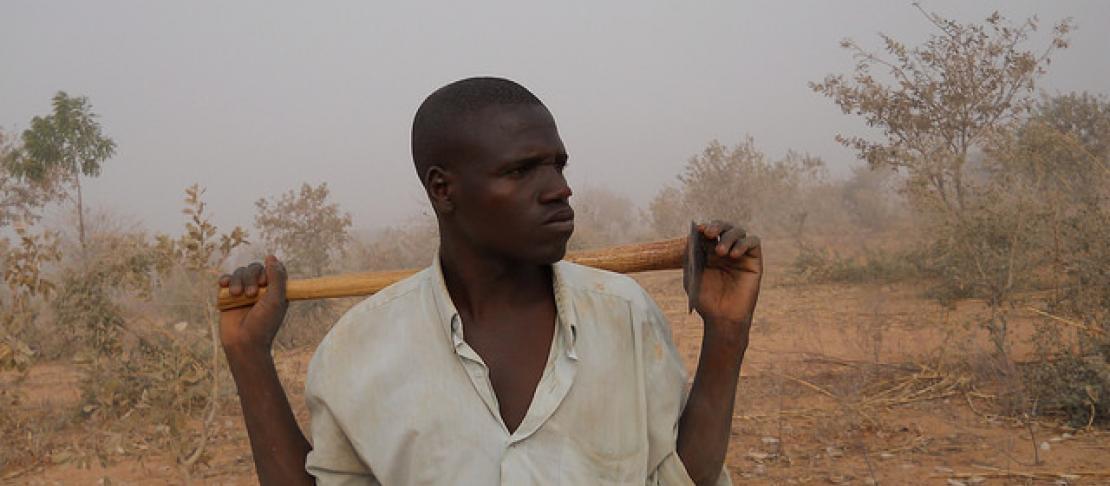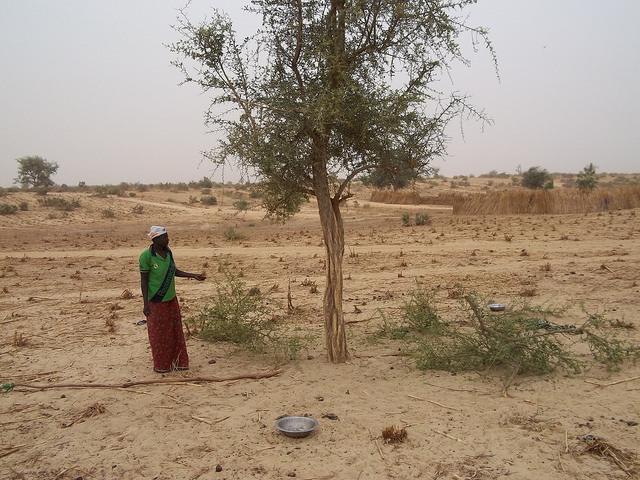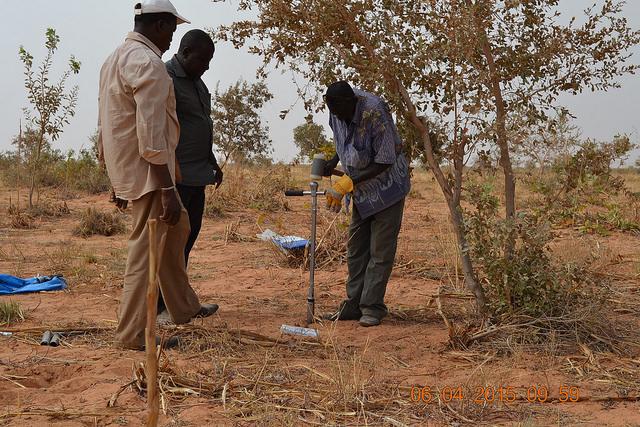How climate-smart is the Farmer Managed Natural Regeneration method?

The method of restoring degraded lands efficiently contributes to climate change mitigation.
Integrating trees in agricultural systems helps rural communities adapt to climate change, mitigate its impact and improve their livelihoods. Particularly for farmers in the Sahel, trees growing on agricultural land play an important role: they do not only prevent soil erosion but provide a wide range of services such as food, increased soil fertility, and fuel wood.
Taking up on the various benefits of trees and to counteract a trend of environmental degradation since the 1970s, non-profit organizations promoted the cultivation and active regeneration of trees on degraded land. This method of restoring degraded lands to regain their health and productivity is known as Farmer Managed Natural Regeneration (FMNR). FMNR is a low-cost land regeneration system as it is based on managing the regrowth of living tree stumps that constitute a vast “underground forest” that is ready to grow.

Trees from FMNR provide leaves for food to Women in Fakara, Niger
Photo: P.SAVADOGO (ICRAF)
FMNR has social and environmental benefits
Several studies conclude that FMNR may have contributed not only to a remarkable rise in vegetation greenness or “re-greening” of the Sahel, but also to improvements in agricultural productivity and environmental conditions. Testimony from FMNR experts and farmers across the Sahel region where FMNR is being implemented shows that FMNR has social and environmental benefits. It has impact on tree cover and diversity and availability of tree products which provide income through sale, and impact on-farm yields through soil improvement and protection.
FMNR is now being considered as a promising climate-smart agricultural practice that represents an affordable means of enhancing rural livelihoods as well, and may contribute to climate change mitigation by sequestering subtantial amounts of carbon in tree biomass and soil in addition to conserving biodiversity. Despite the potential relevance of FMNR as an efficient way to contribute to climate change mitigation and livelihood, there has been so far no attempt to substantiate anecdotal evidence with factual data provided by field-based experiments.
CGIAR Research Program on Climate Change Agriculture and Food Security (CCAFS) launched a series of research activities to respond to this lack of evidence necessary for the acceptance of the benefits of FMNR by development research communities. The research is being implemented by a team of researchers from the Center of International Forestry Research (CIFOR), the World Agroforestry Center (ICRAF), the International Crops Research Institute of the Semi Arid tropics (ICRISAT) and Institute of Meteorology and Climate Research /Karlsruhe Institute of Technology and the National Institute of Agronomic Research of Niger (INRAN) at the Climate-Smart Village in Fakara, Niger.
A set of activities
The first activity, entitled 'Does farmers managed natural regeneration lead to increases in soil carbon and fertility status in arid agricultural landscapes?,' attempts to quantify the effects of FMNR on soil carbon, nitrogen and fertility status through investigation on changes that might be observed between farms under FMNR with various age category and conventional farm (regularly coppiced) stands. This will involve the study of the variation in fine root biomass and their C/N abundance and stable isotopic signatures. The study will contribute to a rigorous evaluation of the C sequestration potential and of the climate smartness of FMNR.

soil sampling for carbon estimation in fmnr farms.
photo: P.savadogo (icraf)
The second activity, entitled 'Tree species composition, diversity and local use in the Farmer Managed Natural Regeneration agricultural landscapes,' specifically aims: (i) to assess tree species diversity and structural parameters in smallholder farms (ii) to evaluate the species diversity and similarity between farms with varying tree management history (iii) to document farmers’ management practices in the area and identify farm and farmer parameters which influence on-farm tree diversity, (iv) additionally, it attempts to determine if there are differences between wood and non-wood uses of tree species, and to establish if certain categories of use are potentially more important in detriment to others.
The third study, entitled 'Factors influencing the conservation of trees on farmland and silvicultural management activity in Sahelian agro-ecosystem,' investigates the drivers of tree presence and density on farmland and silvicultural management activities and identify future areas of focus in dissemination.
The fourth study, entitled 'Spatial variability of crop yield associated with trees presence and density in semi-arid agro-ecosystem,' aims at generating knowledge on the production systems and management of staple crop with focus on ecosystem functions provided by tree-crop integration in FMNR. Spatial variability of crop yield associated with trees presence and density will be evaluated and recommendations for tree management will be made.
These evidence-based activities planned for the coming years will prove the benefits from FMNR and set basis for further scaling up initiatives. The evidence will be compiled to estimate the co-benefits on food security to support the climate smartness of FMNR.
Patrice Savadogo is a Scientist and works at ICRAF and ICRISAT. Sékou Touré is a communications officer at CCAFS West Africa. Mariana Rufino is a Senior Scientist at CIFOR.



